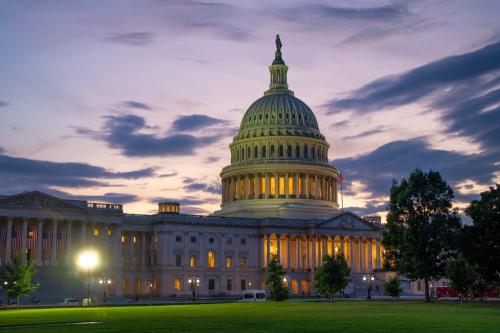Presidents’ annual State of the Union addresses to joint sessions of the Congress have become an important ritual of American democracy ever since Woodrow Wilson journeyed down Pennsylvania Avenue to the Capitol to deliver his remarks in person. (Thomas Jefferson preferred conveying his message to Congress in writing and that practice was the convention for his successors in the White House until Wilson.)
It’s easy to dismiss the pomp and circumstances of such events — and all of the media hype before, during and after the president’s speech in the House chamber. Since the advent of scores of cable alternatives, the public audience for these presidential reports on the broadcast networks and news channels has greatly diminished. Few SOTU addresses prove memorable weeks much less a year or more after they are given and there is little evidence that presidents are able to use them to increase their public support, build coalitions behind their policy proposals, or change minds and votes in Congress.
And yet these days of record low public trust in government, extreme partisan polarization, and dysfunctional politics makes such democratic rituals even more important. Not to increase the President’s ability to reach agreement with an implacable opposition in Congress, produce a bountiful legislative harvest, or reduce the tribalism that is so much a feature of contemporary public life. These are hopelessly unrealistic goals for the coming year.
What President Obama can do is challenge extreme conservative views about what economic policies are needed to achieve higher growth, more job creation and widely shared prosperity; forcefully embrace his signature policy achievement, the Affordable Care Act, while identifying the costs to citizens of undermining its implementation; and speak frankly about how divided party government virtually guarantees acrimony and gridlock under present conditions of asymmetric partisan polarization.
His proximate goals should be to energize his supporters to vote in the midterm elections to preserve their Senate majority and strengthen their position in the House; discredit the conservative narrative about spending, deficits, and economic growth (much of it implicitly accepted by the media); outline steps he will take under his executive authority to advance widely shared domestic and international objectives; and present himself as a strong and determined leader who will take full advantage of his remaining three years in office.
The speech alone is insufficient to achieve these goals but it can set the stage for what is to follow — assuming there is a strategy for how to follow it.
The Brookings Institution is committed to quality, independence, and impact.
We are supported by a diverse array of funders. In line with our values and policies, each Brookings publication represents the sole views of its author(s).


Commentary
SOTU 2014: Why the State of the Union Matters…Even if It Doesn’t
January 23, 2014